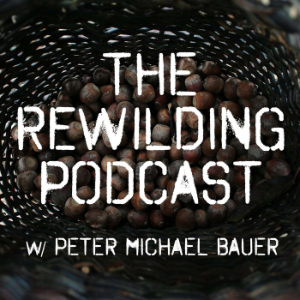
The Rewilding Podcast w/ Peter Michael Bauer
Arts & Culture Podcasts
Are you looking at our society racked with disconnection, poor mental and physical health, social injustice, and the wanton destruction of the natural world and asking yourself, “What can I do?” Join experimental anthropologist Peter Michael Bauer as he converses with experts from many converging fields that help us craft cultures of resilience. Weaving together a range of topics from ecology to wilderness survival skills to permaculture, each episode deepens and expands your understanding of how to rewild yourself and your community.
Location:
United States
Description:
Are you looking at our society racked with disconnection, poor mental and physical health, social injustice, and the wanton destruction of the natural world and asking yourself, “What can I do?” Join experimental anthropologist Peter Michael Bauer as he converses with experts from many converging fields that help us craft cultures of resilience. Weaving together a range of topics from ecology to wilderness survival skills to permaculture, each episode deepens and expands your understanding of how to rewild yourself and your community.
Twitter:
@petermbauer
Language:
English
Website:
http://www.petermichaelbauer.com
Am I Rewilder Enough? w/ Sheila Henson
Duración:01:05:13
How Hunter-Gatherers Learn w/ Dr. Gul Deniz Salali
Duración:01:15:20
Maintaining Peaceful Societies w/ Douglas Fry
Duración:01:35:34
Rekindling Ancestral Lifeways in Ireland w/ Lucy O’Hagan
Duración:01:22:45
Surviving Multiple Environments w/ Tom McElroy
Duración:00:02:52
The Wrong Way to Rewild
Duración:01:13:39
Why We Need Wild Foods w/ Monica Wilde
Duración:01:08:44
Community as the Primary Survival Skill w/ Luke McLaughlin
Duración:01:19:14
Episode 21: Bringing Rewilding to the "Mainstream" w/ Jessica Carew Kraft
Duración:01:10:25
Episode 17: Patron Prompts #2
Duración:00:49:28
Episode 14: Patron Prompts #1
Duración:01:08:02
Episode 3: Food for Thought with Nora Gedgaudas
Duración:01:07:01